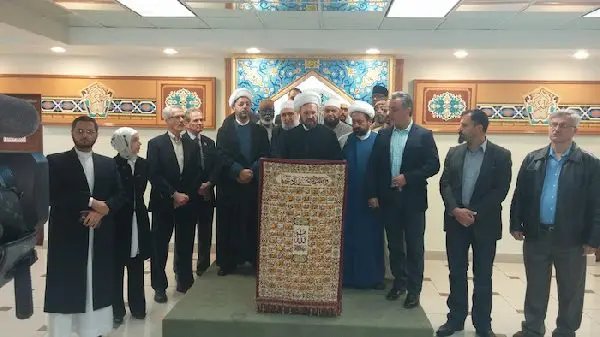
|
| The Michigan Council of Imams at a press conference at the Islamic House of Wisdom, Nov. 18 |
DEARBORN HEIGHTS — After the terrorist attacks in Lebanon, France and Kenya and the increased backlash against Muslim Americans, the Michigan Council of Imams condemned extremism in strong terms at a press conference at the Islamic House of Wisdom.
The council, which includes more than 30 Muslim spiritual leaders of different sects in Southeast Michigan, reiterated that ISIS and other terrorist groups do not represent Islam.
Imam Mohammad Ali Elahi, of the House of Wisdom who co-chairs the council, said violent extremists are “hijacking” the Muslim faith.
“The barbarian bloodshed in Beirut and Paris and daily terrorist attacks in the other parts of the Middle East and Africa are all warnings for us to take terrorism very seriously,” Elahi told reporters. “We must demonstrate better determination to stop this aggression and uproot it from its foundation.”
Elahi added that ISIS contradicts true Islamic values of peace, justice and freedom.
“They are agents of hatred, hypocrisy, greed, destruction and domination,” he said of terrorists. “There is nothing sacred about them. They even attack mosques and places of worship and murder imams and great scholars and men, women and children who are praying and listening to the Quran recitation. ISIS and other terrorists represent the darkness of ignorance, arrogance, evil and injustice but certainly not Islam.”
The imam said the rise of anti-Muslim sentiment is concerning.
“The Muslim community is targeted by two kinds of terrorism: The physical terrorism by ISIS and the psychological terrorism by Islamophobia,” he said.
Amid rumors within and outside the community about terrorist “sleeper cells” in metro Detroit, Elahi demanded that law enforcement agencies act if such a threat exists. The imam asked Muslims to remain alert and report suspicious activities.
Elahi urged the United States to address the underlying political causes behind the rise of ISIS, including the Syrian war and U.S. “Arab allies” that he said are funding terrorism.
Walid Fidama, a Yemeni American activist who was at the conference, told The Arab American News that religious leaders and community members should be more direct in blaming Saudi Arabia.
Fidama said clerics in the Saudi monarchy, a close U.S. ally, are promoting Wahabism, an ultra-conservative school of Islam linked to violent extremist ideology.
“The source of terrorism is Saudi Arabia,” he said. “This is a great crime happening against the world an the Muslim Ummah, its Sunnis and Shia and women and children.”
Calling for solidarity with refugees
Elahi said it is “unfair and immoral” to accuse refugees of terrorism, “while they are the real victims of terrorism.”
Iman Abdulrazzak, of the Michigan Muslim Community Council, asked Gov. Snyder to reconsider his decision to pause efforts to resettle Syrian refugees in the state.
“Instead of giving into fear, this should be a time to increase our empathy for the victims of violence and extremism,” she said, reading a statement.
Abdulrazzak highlighted the economic and cultural contributions of newcomers.
She addressed anti-refugee sentiment among some Arab and Muslim Americans.
“That’s exactly what ISIS wants,” she said. “ISIS wants us to be divided along sectarian or religious lines. It’s unfortunate that even in places within our own communities, sometimes we have people who fall into that trap.”
Abdulrazzak said as Americans, it is unacceptable to be against immigrants and refugees because “other than Native Americans, that’s what we all are.”
Interfaith leaders defend Islam
Bob Bruttell, chairman of the InterFaith Leadership Council of Metropolitan Detroit, called for compassion toward Muslim Americans.
“These are people we stand arm in arm with, who have really been hurt by events in the world that have been directed here, in terms of Islamophobia and so on,” he said.
Brutell asked the wider community to speak out against politicians who fuel bigotry.
He said people need to know that the “hijacking of Islam” by terrorists is a serious problem for Muslims.
“The Americans who stand at the stage with me are as much committed to American ideals as any other person,” he said referring to the imams. “They have condemned and condemned and condemned the terrorism that’s going on in the world. And yet, everyday I am asked, ‘When will those people condemn terrorism?'”
Steve Spreitzer, president of the Michigan Roundtable for Diversity and Inclusion, said 75 years ago the organization stood with Catholic immigrants who were being treated similarly to Muslims today.
Spreitzer said forming relationships and friendships between religious communities and getting to know people on a personal level combats prejudice.
“It’s time to speak out against the accepted narrative that there’s something wrong with Islam,” he said. “I hear it on our television shows and see it in far too many places.”
He said people should stand up for the Muslim community when their friends or relatives bash Islam.
“To not stand up is to agree by your silence,” Spreitzer said.






Leave a Reply